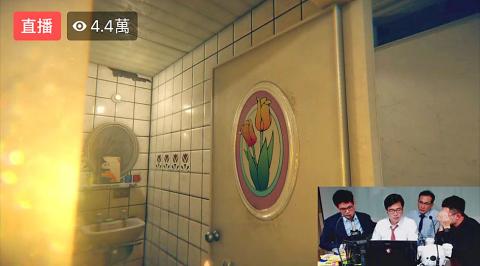A Taiwan-developed horror computer game being boycotted by Chinese netizens over an image mocking Chinese President Xi Jinping (習近平) was removed from global digital distribution platform Steam on Tuesday, just seven days after its release.
The game’s Taiwanese developer, Red Candle Games, said on Facebook that it pulled Devotion (還願) from Steam because of technical problems and alluded to the boycott caused by the artwork that angered Chinese users.
“Due to technical issues that cause unexpected crashes and among other reasons, we are pulling Devotion off from steam store to have another complete QA [quality assurance] check,” the company said in an English-language statement.

Photo: Lo Tzu-hsin, Taipei Times
“At the same time we’d like to take this opportunity to ease the heightened pressure in our community resulted from our previous Art Material Incident,” Red Candle Games said. “Our team would also review our game material once again making sure no other unintended materials was inserted in.”
“Hopefully this would help all audience to focus on the game itself again upon its return,” it said.
The horror puzzle game was released on Tuesday last week, but soon faced a boycott by Chinese users, creating a controversy that has been played up in local media.
Vice Premier Chen Chi-mai (陳其邁) defended the game and criticized China’s censorship and control over the media.
“Only in countries with democracy and freedom can creation be free from restrictions,” Chen said.
A screenshot on a Chinese microblogging site of a charm amulet hanging on the wall of a room in the game angered Chinese netizens after it was noticed that the names of Xi and Winnie-the-Pooh were written on the amulet in red.
The reference was unrelated to any aspect of the game.
Winnie-the-Pooh has been used to mock Xi since a picture of the Chinese leader walking with then-US president Barack Obama in 2013 spurred comparisons to Winnie-the-Pooh walking with Tigger.

Several Chinese Nationalist Party (KMT) officials including Chairman Eric Chu (朱立倫) are to be summoned for questioning and then transferred to prosecutors for holding an illegal assembly in Taipei last night, the Taipei Police said today. Chu and two others hosted an illegal assembly and are to be requested to explain their actions, the Taipei City Police Department's Zhongzheng (中正) First Precinct said, referring to a protest held after Huang Lu Chin-ju (黃呂錦茹), KMT Taipei's chapter director, and several other KMT staffers were questioned for alleged signature forgery in recall petitions against Democratic Progressive Party (DPP) legislators. Taipei prosecutors had filed

Taiwan would welcome the return of Honduras as a diplomatic ally if its next president decides to make such a move, Minister of Foreign Affairs Lin Chia-lung (林佳龍) said yesterday. “Of course, we would welcome Honduras if they want to restore diplomatic ties with Taiwan after their elections,” Lin said at a meeting of the legislature’s Foreign Affairs and National Defense Committee, when asked to comment on statements made by two of the three Honduran presidential candidates during the presidential campaign in the Central American country. Taiwan is paying close attention to the region as a whole in the wake of a

President William Lai (賴清德) has appointed former vice president Chen Chien-jen (陳建仁) to attend the late Pope Francis’ funeral at the Vatican City on Saturday on his behalf, the Ministry of Foreign Affairs said today. The Holy See announced Francis’ funeral would take place on Saturday at 10am in St Peter’s Square. The ministry expressed condolences over Francis’ passing and said that Chen would represent Taiwan at the funeral and offer condolences in person. Taiwan and the Vatican have a long-standing and close diplomatic relationship, the ministry said. Both sides agreed to have Chen represent Taiwan at the funeral, given his Catholic identity and

NEW WORLD: Taiwan is pursuing innovative approaches to international relations through economics, trade and values-based diplomacy, the foreign minister said Taiwan would implement a “three-chain strategy” that promotes democratic values in response to US tariffs, Minister of Foreign Affairs Lin Chia-lung (林佳龍) said. Taiwan would aim to create a “global democratic value chain,” seek to capitalize on its position within the first island chain and promote a “non-red supply chain,” Lin was quoted as saying in the ministry’s written report to the Legislative Yuan submitted ahead of the legislature’s Foreign Affairs and National Defense Committee meeting slated for today. The Ministry would also uphold a spirit of mutual beneficial collaboration, maintaining close communication and consultations with Washington to show that Taiwan-US cooperation